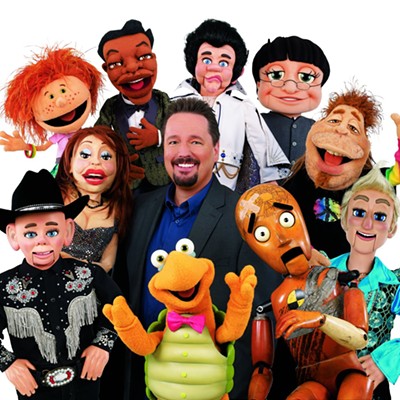How long should I mourn?
Let me ask you, my son.
How long would you wish it?
—from David Ray's poem "The Question"
In his small, book-crammed, two-bedroom house in the Sam Hughes Neighborhood, David Ray stops typing, swivels toward me and thinks aloud. His thoughts drift to the morbid side.
Right now, he's obsessed with the suicide potential of Grand Canyon Skywalk, a glass-bridge walkway at the West Rim that allows visitors to stand 4,000 feet over the canyon floor.
But in Ray's mind, this architectural triumph of tourist-pleasing energy is an obvious recipe for self-obliteration en masse. A diving board for gloomy lemmings. He's so concerned about this possibility that he's writing an article.
"When I first read about the Skywalk, I thought, 'Well, it will certainly compete with the Golden Gate Bridge,'" he says, referring to the modern wonder of the world's notoriety as a popular suicide spot. "The Skywalk only offers a four-foot railing, you know. So I got in touch with the people who run it and asked if they have any insurance. Of course, they do, says the PR person. She faxes me the documentation.
"Turns out the employees and related staff at Skywalk are insured, but not visitors," Ray says, shaking his head. "See anything wrong with this?"
"Wait," I say. "Which magazine are you writing this for?"
Pause. "Well, I don't know," he says, chuckling. "I realize it's a total diversion, but I feel it's necessary." He shrugs. "I'll place it after it's written."
He turns back to his computer.
That's the flip side, or optimistic half, of Ray talking. Despite his crankiness and his deep pessimistic streak, he believes that greater literary success lies ahead. He lives for the chance to write a book that will reach more people, touch more lives, and have more of a positive impact on those who have endured what he endured—parental abandonment, child abuse, the loss of a child.
Ray's buoyancy on writing-related matters is justified. In terms of publishing, things go his way. An essay he spontaneously wrote on solving the problem of America's RV glut—basically, donating unused campers to the homeless, as he did with his own unused Winnebago—ran in The Christian Science Monitor a couple of years ago. A three-part series of memoir-ticles he penned ended up in New York magazine in the late '90s, which led to his harrowing 2003 memoir, The Endless Search, released by edgy, New York City-based Soft Skull—a press that writers a third of his age would kill to publish with.
"Box-office poison," Ray says of his memoir. "It got two reviews. People prefer junk like (Augusten Burroughs' simultaneously released) Running With Scissors."
Despite his advanced age (80) and reputation as a lone wolf of contemporary letters, Ray has a lengthy, growing list of commercial bylines to his credit.
For years, I knew Ray as a local bard whose indie-published verse I reviewed in this paper. I'd vaguely heard of his tenure as editor of New Letters literary magazine at the University of Missouri at Kansas City, and his co-editorship (with Robert "Iron John" Bly) of landmark anthology A Poetry Reading Against the Vietnam War. I knew of the honors (five PEN awards, two Williams Carlos Williams Awards from the Poetry Society of America) and National Endowment for the Arts fellowships. But I had no idea until recently about his connections to nearly every corner of the literary pantheon.
From getting drunk and almost brawling with beatnik pioneer Allen Ginsberg in Chicago, to hosting Ken Kesey's Electric Kool-Aid Acid Test, to firing shotguns with junkie experimentalist William Burroughs, to discovering African-American modernist poet Melvin Tolson by publishing his verse posthumously in New Letters, Ray has a story about, and less than a degree of separation from, just about every famous 20th-century author. His second wife is Robert Bly's current wife.
"All the literary types jumped on the beatnik bandwagon," Ray recalls. "I didn't climb aboard. I somewhat regret that now."
His poetry took a worldly, social-justice-oriented path until the '80s, when life-shattering events, including his son Sam's drinking-related death at college, pushed him to the forefront of Grief Verse. His 1988 Sam's Book, which won the Maurice English Poetry Award and which The New York Times called "heartbreaking," resonates in the field of the Literature of Sorrow.
Ray, who retired from UMKC and moved to Tucson in 1997, is now a Healing Poet. He's prolific, averaging a book a year. He continues to conduct workshops and readings across the country.
He shows me a letter that arrived last month from a woman in Scotland, thanking him for writing Sam's Book and lamenting that it was out of print. The day the letter arrived, Ray says, Wesleyan University Press announced a Kindle version of the book. (I immediately downloaded it; you should, too.) Like I said, literary success rolls in his direction. When it doesn't, Ray works harder.
Like this morning: Ray sits at his computer with a cup of tea, tinkering with a longer nonfiction manuscript, a sequel to The Endless Search, which details a dark, dismal, Depression-era childhood in Oklahoma.
"We lived in a shack with a dirt floor on the edge of a hill," he says. "At one point, my father went into town to be a barber, and failed at that, too."
Ray's sharecropper father disappointed on every level. After his dad abandoned the family by hopping on a watermelon truck, Ray and his sister ended up at the mercy of relatives, foster families and a state orphanage in Tulsa. For Ray, life got worse.
Searching for a father figure as a teen, Ray was adopted by a sadistic Oro Valley rancher who abused him for several years, all of it brutally chronicled in The Endless Search. Alcoholism followed, with Ray eventually finding help through Alcoholics Anonymous.
"My writing isn't charming," he says. "I deal with issues that turn people off. Hurt. Anguish. Damage."
For people who've experienced what Ray has, he's a voice of comfort, a lifeline. He shows me another email, from a couple in Florida who lost a son and read Sam's Book. "If we had not found your book," they write, "we would have killed ourselves."
Moving back here with his wife, Judy (also a writer), to the place where he was tormented wasn't difficult. Ray has fond memories of Tucson High School, which helped him secure college scholarships, opportunities to escape his abuser and travel the world.
"Tucson is about as good as it gets, except for the government," he says. "There's always something new and crony-istic to read about in the paper."
Ray can't chat now. He's late for a Quaker meeting.
"I don't have much faith," he says. "But I like to sit next to people who do. I follow where the spirit leads."









